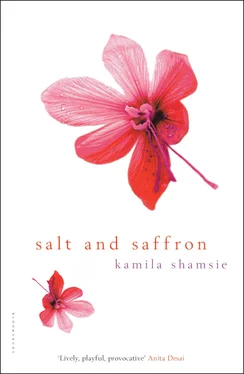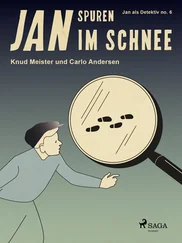The lights flared back on and I went inside. Sameer was in my parents’ room, the door ajar.
‘But do we know anything about him? What’s his family?’
Sameer ignored Aba’s second question. ‘We know Samia likes him. And Rehana Apa, whose opinion you’d trust completely if you knew her. He’s been to Baji’s for tea. She invited him to return. What more do you need to know?’
I entered the room. ‘He’s staying with his family in Liaquatabad.’
Aba’s eyes rose sharply at this, and even Ami looked unhappy.
‘And he’s brought over dinner, so you can’t say I have to whisk him away before we’ve eaten,’ Sameer added.
‘Dinner? Why? Does he think we’re not capable of feeding our guests?’
‘Nasser, now stop being annoying. It’s a thoughtful gesture, although, of course, he could just be trying to get into our good books. I didn’t really mean that, Aliya. Where is he?’
‘Gone to get something from the car.’
‘Probably the food,’ Sameer said. ‘I’ll help him. Can I just microwave it and tell Wasim we’re eating right away? I’m starving.’
Sameer was so good with exits.
‘This is the boy from the plane, is it?’ Ami asked.
‘What boy from the plane?’ Aba looked wounded.
‘Girltalk, Nasser. You didn’t mention the Liaquatabad part, Aliya. Why not?’
‘Why do you think?’ I blew out the candle which was flickering, forgotten, in the blaze of the lamplight around the room. We had reached an impasse.
Or perhaps not. ‘You know you’re in Karachi now.’ That was Aba, of course. It had taken him several seconds to think up this line. ‘There are certain rules you have to live by. Just as a mark of respect to others.’
I knew that. I knew that I had never admired people who claimed to be non-conformist but were really just self-absorbed. I knew that it was all I could do at that moment to stay in my parents’ company with Khaleel at a short sprint’s distance.
‘I hope he hasn’t brought burgers for dinner.’ Ami didn’t meet my eye as she said this.
‘Food’s on,’ Sameer said, poking his head in. ‘And this is Khaleel.’ Khaleel shook hands with my father, nodded at Ami, smiled. I could see them thinking it was clear that I’d fallen for his good looks alone.
‘Are you having power failures in Liaquatabad, too?’
‘I don’t know, sir. I came straight from the air—’ He bit off the last syllable and looked at me to see if he’d committed a faux pas.
Why hadn’t Sameer just picked me up and driven us to a restaurant?
‘That smell,’ Ami said.
Now what? Don’t tell me he wasn’t using deodorant.
‘Good God!’ Aba said.
I stepped out into the dining area, and then it hit me, too.
A smell that was not so much a smell as a miracle. Different strands of smells coming together like an orchestral symphony. Aba moved to one side, and my eyes helped my nose to pick up each nuance of detail. There on the table: biryani, timatar cut, bihari kebabs, aloo panjabi, raita. But these names don’t tell you enough. They need a prefix: Masoodian.
I grabbed on to Khaleel’s arm.
‘Quite a journey your cousins sent me on. Said they’d arrange my ticket, and next thing I knew I was travelling via Istanbul. Some guy met me at the airport — said he knew your great-aunt — and handed me this package of food. If Sameer hadn’t come to the airport in Karachi, with a list of his connections poised to leap off his tongue in a swallow dive, those customs guys would have confiscated the package for sure. You could see their mouths watering at the thought of it.’
‘Do you know …’ I could barely form the words. ‘Where it came from?’
‘A restaurant. Your great-aunt’s friend translated the name for me. The Garrulous Gourmet.’
Somehow we made it to the table, and sat down. What can I say about the food? That nothing had ever tasted better. That words reveal their inadequacy every time I try to describe it. That sometimes it seemed we were all eating faster than was possible and other times so slowly it defied all the laws of motion. That the grains of rice in the biryani were swollen but separate; that the saffron had been sprinkled with a hand that knew the thin line between stinting and showing-off; that the chicken was so succulent you had to cry out loud. I could tell you about the aloo panjabi with its potatoes that reminded us why a nation could live on potatoes and die without them; I could mention its spices, so perfectly balanced you could almost see the mustard seed leaning on the fenugreek, the cumin poised on the dried chillies. If that’s not enough let me try to evoke the bihari kebabs, the meat so tender it defied all attempts to make it linger in our mouths, and yet it lingered on our tastebuds before graciously making way for all the other tastes worthy of attention. And, while I can still think of it without falling to my knees in thanks, allow me to mention the timatar cut, which takes the familiar tomato and transports it into a world inhabited by ginger, garlic, chillies, green and red, karri pattas, and the sourness of tamarind. To eat that meal was to eat centuries of artistry, refined in kitchens across the subcontinent. The flavours we tasted were not just the flavours in the food, but also the flavours the food reminded us of and the flavours the food remembered.
But saying all of this is not enough. When I tasted that food I saw Mariam in a kitchen, a vast glorious kitchen, brushing saffron off her husband’s neck and dusting it on to her own lips. I saw Mariam listing names of vegetables — mooli, loki, bhindi, shaljam, gajjar, mattar, phool gobi — as though the list were a ghazal, while Masood kneaded mangos to pulp in a bowl which suddenly had four hands, not two, intertwining and pressing. When I tasted that food I saw Mariam older and happy.
Khaleel said something to make Aba laugh and I saw Ami lean forward to Khaleel and speak, speak without stopping until she had to stop because Aba threatened to eat the last piece of chicken on her plate since she didn’t seem interested in it. Khaleel looked at me and I wanted everyone else to disappear. But in some sense they had disappeared while he was looking at me in that way he had of looking at me.
When the meal was finally over — the plates not licked clean, not entirely, because that would have meant that the cook miscalculated quantities, but nearly so, so very nearly so — Khaleel picked up the last grain of rice on his plate and, with everyone else distracted by satiation, he placed the wonder of it all on my tongue.
‘I’m stopping in Istanbul again on my way back to America,’ he said softly. ‘Right before the semester begins. You’re flying out around that time, too, aren’t you?’
Ami turned to ask him something and I was left thinking of all that his question implied. Was it merely coincidence, the timing of all that had happened? Or would I never have asked the questions I asked if I hadn’t met Khaleel? How can we ever know why one thing happens and not another? Perhaps, I thought, watching the curve of his neck as he laughed, perhaps when we tell our stories our stories tell on us; they reveal what is and what is not explicable in our lives. In all those years Mariam lived with us I never asked that she be explained to me. That she was who she was was enough. The answers I’d been searching for so desperately since then all stemmed back to one question. The question of why she loved Masood. I had reasons now, I had explanations for every thing she’d ever not said, for everything she’d done. Her mother’s social status; a desire to subvert hierarchies; a search for answers about why Taimur left; her final conversation with the man whom she had never considered loving (who might even have been Meher Dadi’s friend from Turkey, or his son). All these were answers and together they might even form a whole. Some of them might even be more than conjecture. But none of this tells me why she loved Masood. Khaleel rested a hand on the back on my chair, his palm pressing against the small of my back in the spaces formed by the latticed design of the wood. No, none of this answered the unanswerable question.
Читать дальше












